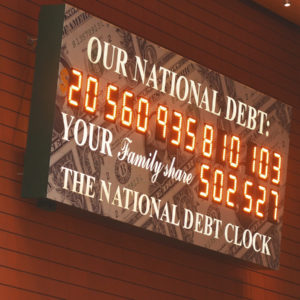Midway between the second and third Democratic presidential debates, we should pause to take stock of what we’ve seen. Eight moderators have grilled more than 20 candidates for nine hours on national television. Yet, the most interesting part of it all is that more than two dozen candidates and journalists managed to run out the clock for nine hours without even mentioning any of the most vexing issues the nation faces. This is an achievement even by political and journalistic “standards.”
Of course, the candidates happily listed all the “free” things they would lavish on voters, from health care to college tuition to child care. One candidate, Andrew Yang, cut all the way to the chase and promised everyone $1,000 per month if he wins. Apparently, buying votes is legal if you pay with someone else’s money.
But not one candidate mentioned the $22 trillion federal debt. Not one.
The federal debt is so large that, even with interest rates at historically low levels, the interest payments alone cost the government around one-half trillion dollars per year. If interest rates return to their historical average, the annual interest on the debt will cost about twice what the government spends on the entire Department of Defense. And given that trillion-dollar deficits have become the new “normal,” our government can’t afford its current interest expense, let alone the expense it will incur when interest rates rise. We have a name for this: bankruptcy. The most expensive government in human history is bankrupt, and neither the candidates for its highest office, nor journalistic moderators charged with questioning them thought it important enough to discuss.
We can almost forgive the candidates. They are trying to get elected, after all. And neither of the only solutions — dramatically raising taxes on everyone or dramatically cutting spending — will play well with voters. Any candidate who says something honest like, “I know you want free things, but we simply cannot afford them,” won’t be invited back for the next debate.
But if the candidates can be forgiven, the so-called moderators cannot be. It was their job to ask the hard questions, and they asked a series of softballs that might as well have been written by the candidates themselves.
Why were the moderators behaving like political lackeys? Because that’s largely what they are.
Presidential debates are arranged by the party’s national committee. In this case, the Democratic National Committee decided which candidates would be invited to appear, what format the debate would take, and which networks would televise the proceedings. The blessed networks, in turn, chose the moderators. It should come as no surprise to sober-minded viewers that the DNC has a vested interest in making the candidates, and the party itself, look as good as possible. And therein lies the rub.
The DNC is not a governmental body, nor does it exist to serve the public good. The DNC is a private corporation that exists to further the goals of the Democratic Party. The DNC furthers the goals of the Democratic Party by making the Democratic candidates look as good as possible to the voters. In the past two debates, that meant skirting important and difficult issues in favor of promising handouts. As we look forward to the next debates, we should expect more of the same.
There is a way these debates could help the voters to understand both the important issues of the day and what the candidates would do to address them. Let the presidential debates be moderated by people inclined to ask hard, but fair, questions of the candidates — people who would then insist that the candidates answer those questions sensibly.
This is not what the politicians or the networks want. But it is what we need.

